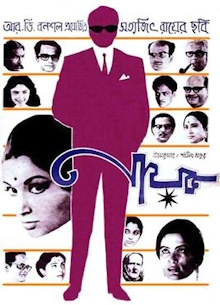We’ve worked our way through a fair number of the films of Satyajit Ray and while this one wasn’t made that late in his career, it feels more modern to me than many others. It takes place almost entirely on a train and while there are several supporting characters, the sole purpose is to shine light into the psyche of its main character. Between the flashbacks and the dream sequences that are rife with symbolism, it even has something of a postmodern feel to me. I had a little difficulty getting into it at first because I thought the stories of the other characters would matter more. Once I realized what it was going for, I was impressed by the richness of the characterization and how full of nuances it is.
A rich and successful actor Arindam Mukherjee decides to go to Delhi to receive an award despite having decided not to go earlier. The night before he had been involved in a fistfight at a club and the incident has been reported in the morning’s newspapers, prompting his change of mind. Due to his last minute decision, his staff was unable to book a private train compartment, so he shares one with a family. In the restaurant car, he meets Aditi Sengupta, a young woman who edits a women’s magazine. She considers herself too intellectually sophisticated to be interested in the mass market films that he makes but her friends egg her on to interview him and he gamely agrees. Over the course of the twenty four hour train journey, they meet several times as he gradually reveals more of his real self, speaking of how he got started in acting, his insecurities about the artistic merit of cinema and his guilt over the friends and people he sacrificed along the way. His honesty may have been prompted by his dreams during his restless sleep on board the train.
This film threw me off for a while because there are several other supporting characters who have stories of their own going on. The family whose compartment Arindam shares for example includes a mother nursing a sick daughter while the father spends his time with an advertising executive with an attractive wife. Eventually I figured out that they’re there to reflect different parts of Arindam’s life and to illuminate aspects of his personality. So the reluctant wife who is encouraged by her husband to flirt with the businessman stands in for Promila, an actress who begged for a role from Arindam by offering herself. The intended impact is somewhat muted for me because Arindam just doesn’t seem like that bad a person from a modern perspective. He is kind to everyone despite his fame and wealth, and even if that is partly motivated by the need to protect his public image, what does that matter? Similarly his affair with Promila is a nothingburger, considering how hard she sells herself. It’s evident that Ray made this in view of social mores and moral values that are much more conservative and traditional than what we’re used to today so Arindam’s behavior and personality just doesn’t evoke the expected outrage or condemnation.
Still, it can be denied that it’s this conflict within Arindam that allow room for so much nuance in his characterization. Even though he moved on to the better paying and more prestigious cinema industry years ago, there’s still something in him that resonates with his old mentor’s admonition that it’s an inferior art form compared to live theatre. Even as he stands at the pinnacle of Bengali cinema, he is always aware of how quickly he will fall after only a few box office flops. To ensure that he continues to be successful and beloved by the public, he is always conscious of his public image. It’s fantastic how Aditi is initially disdainful towards someone she considers vain and shallow. But as she listens to the story of his life, she grows to know the man underneath the movie star exterior and sympathizes with the sacrifices and compromises he has made on the path to success. The climax is quite shocking as she fears that his ruminations may lead him to suicide and refuses to leave him alone. These interactions also reveal depths in Aditi herself, proving that she is indeed an ethical and humanistic intellectual, and not a muck-raking journalist.
As the film pretty much takes place entirely on a train, with the exception of the flashback scenes and dream sequences, it’s very limited in scope. The performances of all of the actors are outstanding however and it is interesting how the other characters are used to highlight aspects of Arindam’s life. My wife also commented on how surprising it is to see a Ray film featuring a wealthy character after the abject poverty of the Apu trilogy. It feels much more like a modern drama rather than the fables of his other films. I can’t say that it’s among my favorites because I find it difficult to identify with a movie star, no matter how sympathetic he is, but I can appreciate what a masterful work it is.
